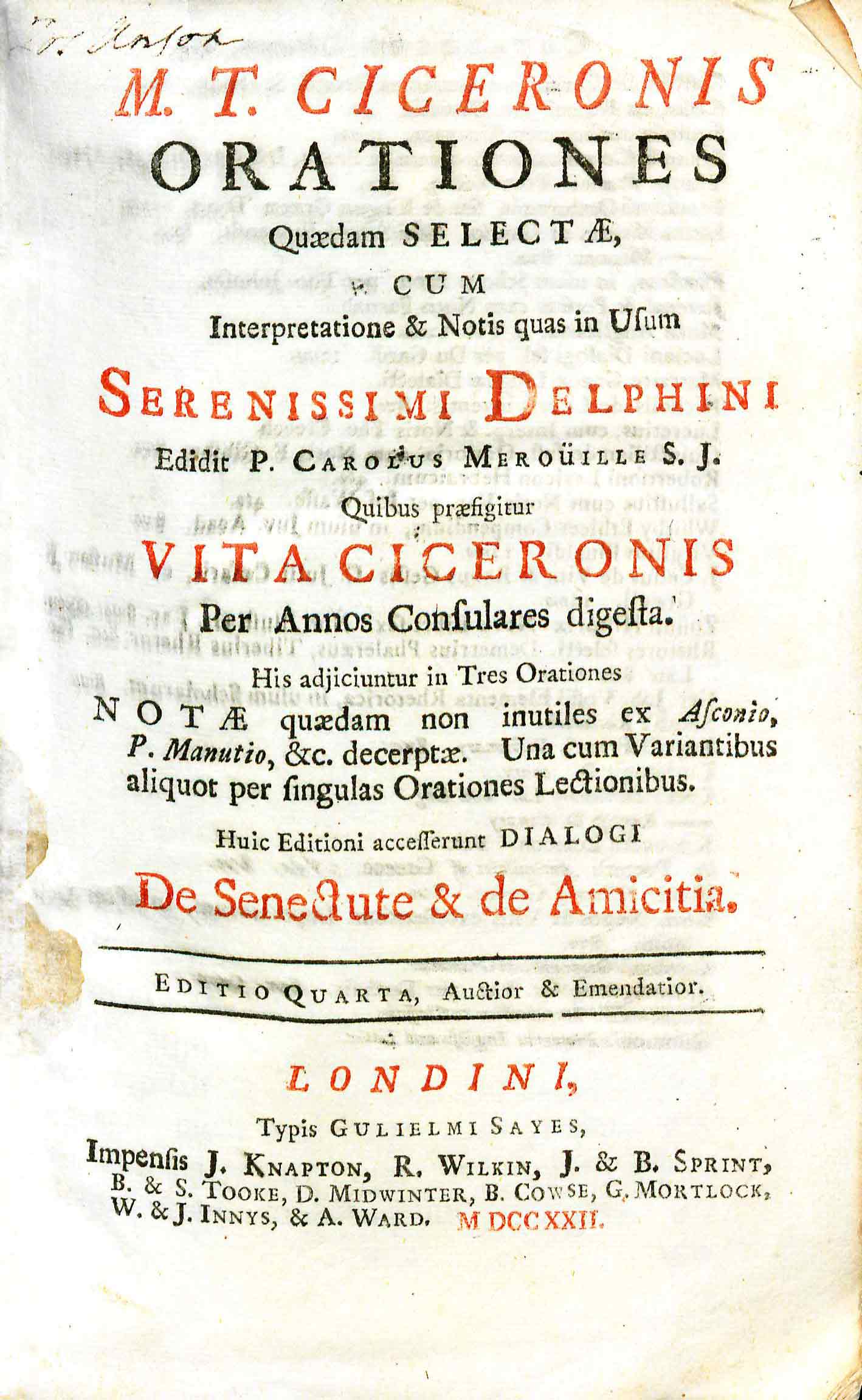M.T. Ciceronis Orationes Quaedam Selectae
by Marcus Tullius Cicero
| M.T. Ciceronis Orationes Quaedam Selectae | |
|
Title page from M.T. Ciceronis Orationes Quaedam Selectae, George Wythe Collection, Wolf Law Library, College of William & Mary. | |
| Author | Marcus Tullius Cicero |
| Editor | Charles de Hallot de Mérouville |
| Published | Londini: Typis Gulielmi Sayes, impensis J. Knapton, R Wilkin, J. & B. Sprint, B. & S. Tooke, D. Midwinter, B. Cowse, G. Mortlock, W. & J. Innys, & A. Ward |
| Date | 1722 |
| Edition | Editio quarta, auctior & emendatior. |
| Language | Latin |
| Pages | [8], xxx, 555, [13] |
| Desc. | 8vo (20 cm.) |
| Location | Shelf J-4 |

Marcus Tullius Cicero (106–43 BCE) was a Roman philosopher, politician, lawyer, orator, political theorist, consul, and constitutionalist. He is widely considered to be one of Rome’s greatest orators and prose stylists.[1] Cicero's influence on the Latin language was so immense that the history of prose in both Latin and European languages up to the nineteenth century was said to be either a reaction against or a return to his style.[2]
In addition to his profound skills as a linguist, translator and philosopher, Cicero introduced the Romans to the chief schools of Greek philosophy and created a Latin philosophical vocabulary.[3] When Cicero’s letters were rediscovered in the fourteenth century, his teachings and writings became a foundation for the initiation of the fourteenth century Renaissance.[4] According to one historian, “[The] Renaissance was above all things a revival of Cicero, and only after him and through him of the rest of Classical antiquity.”[5]
The Peak of Cicero’s influence came during the eighteenth century Enlightenment.[6] His work had a profound impact on the individuals who were most influential during the Enlightenment such as John Locke, David Hume, and Montesquieu.[7] As a politician, Cicero was a fierce advocate for republican principles.[8] It was this highly pro-republic philosophy that caused Cicero’s work to have a great impact on the Founders of the United States.[9] John Adams said of Cicero, “As all the ages of the world have not produced a greater statesman and philosopher united than Cicero, his authority should have great weight.”[10] Thomas Jefferson lists Cicero (along with Aristotle, Locke and Sidney) as an author of "books of public right" which provided "harmonizing sentiments of the day" which Jefferson express in the Declaration of Independence.[11]
Evidence for Inclusion in Wythe's Library
Listed in the Jefferson Inventory of Wythe's Library as "Ciceronis orationes selectae Delph. 8vo." Thomas Jefferson gave Wythe's copy to his grandson Thomas Jefferson Randolph. The precise edition owned by Wythe is unknown. George Wythe's Library[12] on LibraryThing indicates as much while noting "Numerous octavo editions were published at Cambridge and London, the first in 1692." The Brown Bibliography[13] lists the 1722, London edition and this is the one the Wolf Law Library chose to purchase.
Description of the Wolf Law Library's copy
Bound in original decorative calf binding with copperplate ink signature to title page. Includes the bookplate of the Monastery of St. Augustine, Ramsgate, pasted over an earlier bookplate for Bousfield and Pallsiter's Circulating Library, Margate. Purchased from Rooke Books.
Images of the library's copy of this book are available on Flickr. View the record for this book in William & Mary's online catalog.
See also
- George Wythe Room
- Jefferson Inventory
- M. Tullii Ciceronis Opera cum Delectu Commentariorum
- M. Tullii Ciceronis Opera quae Supersunt Omnia: ad Fidem Optimarum Editionum Diligenter Expressa
- Wythe's Library
References
- ↑ Elizabeth Rawson, Cicero: A Portrait (Bristol: Bristol Classical Press, 1994), 303; Henry Joseph Haskell, This was Cicero (New York: Fawcett Publications, 1964), 300-01.
- ↑ Merriam-Webster's Encyclopedia of Literature, s.v. "Ciceronian period" (Springfield, Mass.: Merriam-Webster, 1995), 244.
- ↑ Gian Biagio Conte, Latin Literature: A History (Baltimore: Johns Hopkins University Press, 1994), 199.
- ↑ Liana Cheney, "Italian Renaissance Art: Humanism & Philosophical Background: Neoplatonism, Ficino and Pico," accessed October 24, 2013.
- ↑ Tadeusz Zielinski, Cicero im Wandel der Jahrhunderte (Leipzig: B. G. Teubner, 1897).
- ↑ Neal Wood, Cicero's Social and Political Thought (Berkeley: University of California Press, 1988), 168.
- ↑ Ibid.
- ↑ M. N. S. Sellers, American Republicanism: Roman Ideology in the United States Constitution (New York: New York University Press, 1994), 57.
- ↑ Ibid.
- ↑ Ibid.
- ↑ "Thomas Jefferson to Henry Lee, Jr., May 8, 1825" in The Thomas Jefferson Papers Series 1 General Correspondence 1651-1827 (Washington DC: Library of Congress), images 219-220.
- ↑ LibraryThing, s.v. "Member: George Wythe" accessed on November 13, 2013.
- ↑ Bennie Brown, "The Library of George Wythe of Williamsburg and Richmond," (unpublished manuscript, May, 2012) Microsoft Word file. Earlier edition available at: https://digitalarchive.wm.edu/handle/10288/13433.

